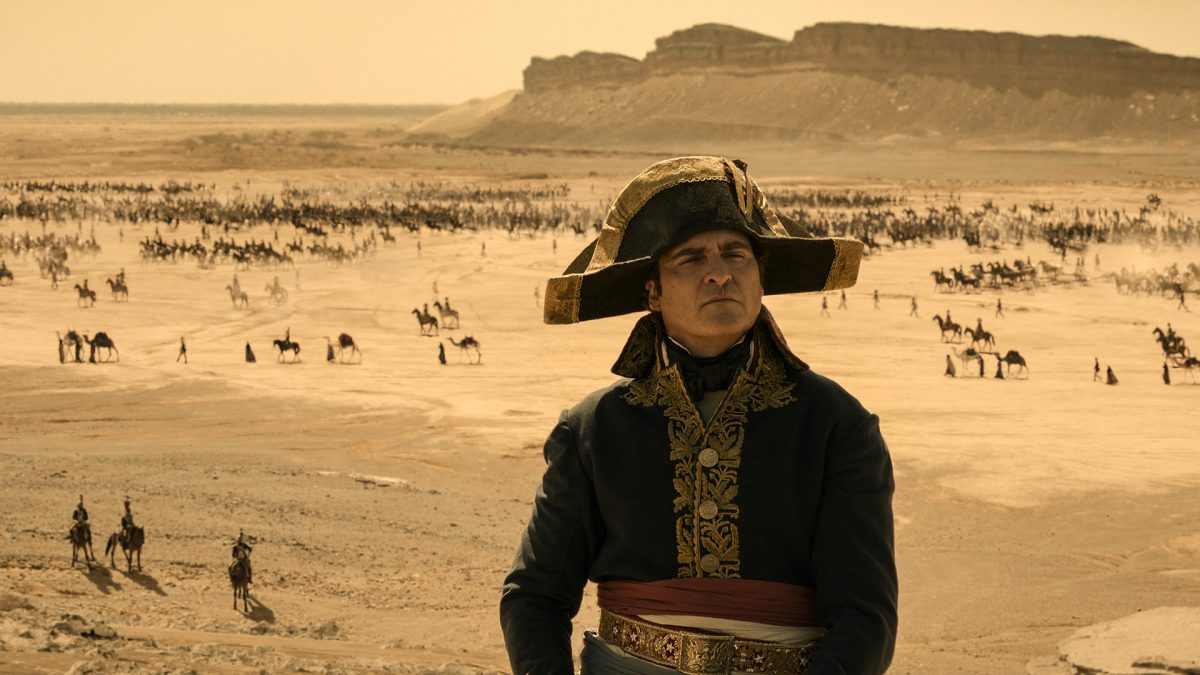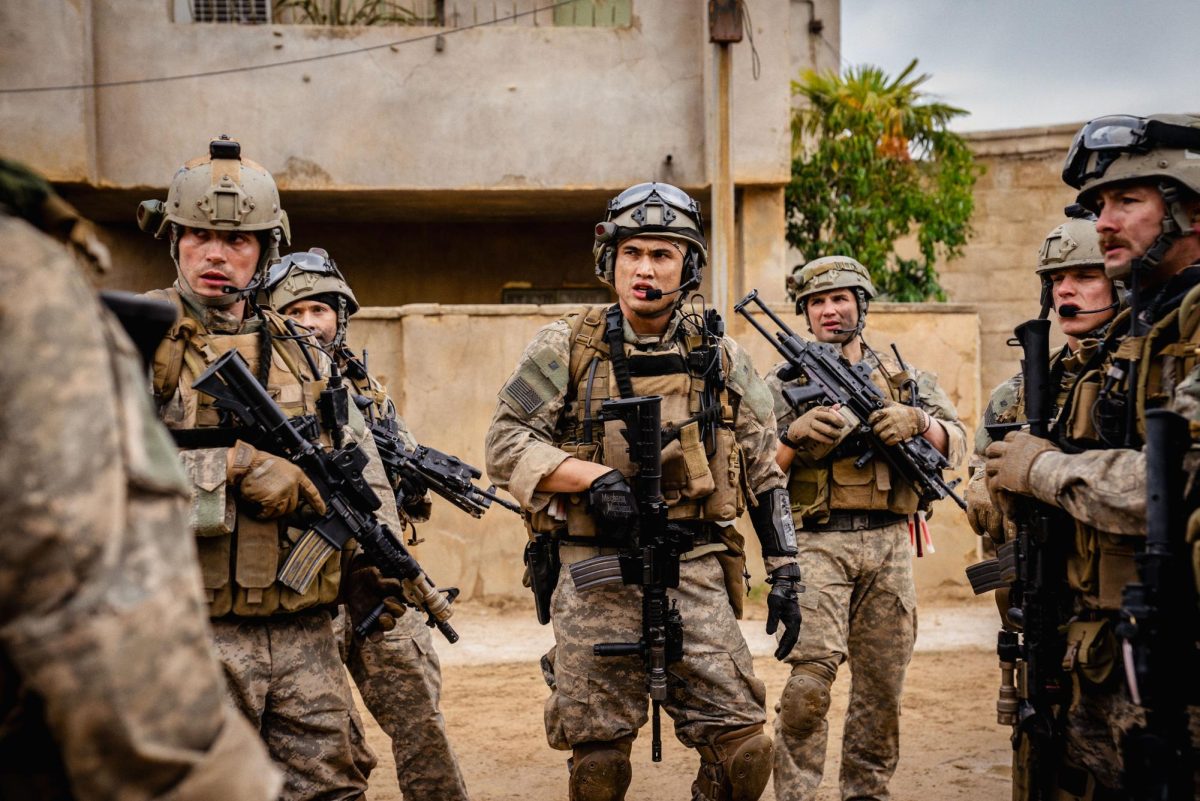Adding onto the impressive and long-running repertoire of the famous director and writer Ridley Scott comes one of the most widely anticipated films of November, released Nov. 22. Combining his talents with world-renowned actor Joaquin Phoenix, Scott casts his own dynamic portrayal of Napoleon onto the big screen.
The two and a half hour piece explores the facets of Napoleon’s personality, examining his endless ambition put at odds by his poor social skills and desire to find a true, personal connection with the woman he loves. The film attempts to portray a complete, historically accurate Napoleon, cast beautifully by Phoenix’s performance, from start to finish. However, when viewing the movie as a whole, it becomes painfully obvious that the true intent behind Scott’s direction for the film is confused, thus leaving the audience confused in its wake. The film can’t decide whether it wants to be a comedic biopic or a historical epic, ultimately harming the end product.
“Napoleon,” in essence, is the documentation of one of the greatest leading figures in history, with some fictional liberties taken along the way in order to maintain drama. Phoenix depicts a man gripped by the power of victory, experiencing his first battle as a leader with a cunning win over the British. From there, Napoleon rises to even greater heights, from promotion into his involvement with greater politics. Each new rung that Napoleon grips on the ever-growing ladder of power brings with it a set of new opponents to face off against, whether they be on the battlefield or in the courtroom.
Through it all, Napoleon comes out on top with the power he desires and his leadership and military brilliance assist him to do what he always wanted to do: obtain the attention and abilities of the ruler of the world and hold it tightly for all time. This steady collapse into tyrannical government from great ambition is done extremely well through Phoenix’s captivating performance, emulating a socially inept man with a need for love and attention in his life who experienced political power for the first time and constantly craved more.
Post-revolutionary France was a time of great conflict, with every recorded decade from the end of the French Revolution depicting a war across the European continent. These wars, known in history as the Napoleonic Wars, are a key focal point of not just the time period, but in understanding exactly who Napoleon is as a general and as a person. Scott understands the necessity for this key element to be included within the narrative, including three terrifically shot battle scenes throughout the course of the film. While the historical accuracy of these battles may be subject to debate, the battle’s spectacle with volleys of cannon shots and rows of charging cavalry are more than enough to engross the audience, with the beautiful scenery of the conflict leaving the viewer with awe and splendor despite its bloody nature.
These battles did justice to Napoleon’s sense of military tactics, as he outmaneuvered and out-strategized his opponents with satisfaction. His victories became progressively few throughout the film’s runtime as his status and his mind begin to slip. All of this contributes to Scott’s idea of a historical epic and not only serves small bits of historical accuracy but builds on Napoleon’s characterized trait — a military genius subject to the will of time.
These battles, unfortunately, are contrasted with the time Napoleon spends gathering different outlets of power to connect to throughout France, which would not sound flawed when read on paper. However, the writing throughout these sections, as well as the direction for the actors, sends ripples through the tone and leaves it inconsistent. Multiple scenes exist within this movie where Napoleon is meant to be intimidating and calculating in order to strengthen his French regime.
However, through David Scarpa’s writing and Scott’s direction, Napoleon is sometimes portrayed in a comical light, spouting whiny dialogue on top of a performance clearly directed to be lighthearted for some bizarre reason. This half of the movie completely clashes with the other half, the serious battles that portray the dominance of this powerful emperor and his army. Normally it would be a part of the craft to handle shifts in tone scene by scene with subtlety and grace, both of which are lacking in “Napoleon.”
As mentioned before, the cinematography throughout “Napoleon” is standout material. The slower sections of the movie, devoid of battle, while previously mentioned to be tonally inconsistent, are at least shot in a way to make the inconsistencies entertaining. Oftentimes, the camera will linger on Napoleon in order to demonstrate his power over a room, or pan over him toward his troops in order to express the loyalty among his men. These shot choices are more assuredly intentional, and go a long way to enforce the continuous growing ambition of Napoleon.
When observing the finished product, it is safe to say that the movie is quite divided in how it grabs its audience’s attention, whether through an epic battle sequence or an unintentionally hilarious diplomatic negotiation. This division, while hindering the movie, does not render it devoid of any quality, as the skyrocket performance of its star and the cinematography of Napoleonic France and its numerous conflicts gave this film a refined edge that Scott was most assuredly looking for.






















Patti • Dec 30, 2023 at 9:04 pm
This was the worst, the worst movie I have ever seen! 90 percent violence and gore that was so unnecessary! I wish they had stayed more to just the historical aspect of Napoleon.